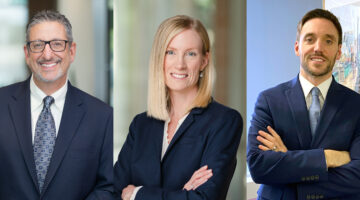On May 11, 2021, the SJC affirmed the dismissal of a Relator’s Qui Tam complaint against Conn Kavanaugh’s client, Citigroup.
Carol Starkey and Andrew Dennington acted as local counsel for Citigroup, one of the defendants in a massive False Claims Act case, which raised an issue of first impression as to whether the so-called ‘disclosure bar’ of the Massachusetts False Claims Act required dismissal of the Relator’s Qui Tam complaint.
The SJC found that there had been a prior, public disclosure of the essential elements of the alleged fraud via a publicly accessible website and that the Relator, or whistleblower, did not qualify under the “original source” exception to the public disclosure bar.
The case is a significant win for FCA practitioners, and a significant outcome for the client, Citigroup.
See SJC-12973 Johan Rosenberg vs. JPMorgan Chase & Co. & Others
Massachusetts Lawyers Weekly reported on the case in their May 20 article “Public disclosure bar thwarts FCA qui tam suit,” which can be read below.
“Public disclosure bar thwarts FCA qui tam suit” by Eric T. Berkman, Massachusetts Lawyers Weekly
A private individual whose forensic analysis of publicly available data concluded that financial institutions were setting interest rates on certain municipal bonds in a fraudulent manner could not bring a whistleblower action on the state’s behalf, the Supreme Judicial Court has ruled.
Relator Johan Rosenberg used proprietary software to analyze thousands of transactions disclosed on a municipal bond website accessible to the general public. He claimed the results indicated that a number of banks, including defendants JPMorgan Chase, Citigroup, Merrill Lynch and Morgan Stanley, acting as “remarketing agents” for a type of tax-exempt municipal bonds known as variable rate demand obligations, or VRDOs, colluded to set interest rates at an artificially high level on the bonds.
In doing so, Rosenberg alleged, the banks cost the state millions of dollars in excess interest and fees while misrepresenting that they had met their obligation to reset and remarket VRDOs at the lowest possible rates. He claimed that violated the Massachusetts False Claims Act.
A Superior Court judge dismissed Rosenberg’s claim in 2019, finding that the FCA’s “public disclosure bar” — which disallows qui tam suits based on information previously disclosed to the public through the news media — precluded Rosenberg’s suit because he did not qualify as an “original source” of the information upon which he based his allegations.
The SJC affirmed, rejecting Rosenberg’s argument that because the website through which he accessed the financial data, Electronic Municipal Market Access, or EMMA, does not have editorial content or analysis of the data it reports, it does not constitute news media within the meaning of the False Claims Act.
By providing free public access to municipal securities data, EMMA provides investors and governmental entities with key information and tools to put such information into context, making it “much like traditional news sources that report market data and fall within the scope of the term,” Justice Dalila A. Wendlandt wrote for the SJC. “Accordingly, we conclude that the term “news media” in the public disclosure bar includes within its scope the EMMA website, which consists of publicly accessible financial data.”
The 36-page decision is Rosenberg v. JPMorgan Chase & Co., et al., Lawyers Weekly No. 10-057-21.
Thwarting the purpose?
Suzanne E. Durrell of Milton, one of the plaintiff’s attorneys, said she was disappointed with the decision.
“However, we are gratified that attorneys general in New York and Illinois have recognized the importance of uncovering the defendants’ alleged fraud and vetoed the banks’ efforts to avoid liability on public disclosure grounds,” Durrell said.
The New York and Illinois cases, with alleged damages of more than $500 million, are moving forward, she said.
Durrell also noted that a California court considering a related case held that the public disclosure bar did not apply in this context.
Royston H. Delaney, a Boston attorney who represents whistleblowers in FCA suits, said he thought the case was badly decided.
“The whole purpose of the public disclosure bar is to avoid situations where the government already knows about a fraud and yet someone files a qui tam suit and basically shares the recovery when they, in fact, did nothing,” Delaney said. “But the government was not pursuing this issue on its own, so in what way could this be considered one of those parasitic suits? I just don’t think it can.”
“The whole point of this legislation is to incentivize people to combat fraud, and this discourages those people. The court could have said, ‘OK, you’ve taken raw data and added value.’ I don’t see a good reason they chose not to.” – Rory Delaney
Delaney also criticized the court’s take on what constitutes “news media” for FCA public disclosure bar purposes.
“They could have said pure data is not media because it doesn’t involve an interpretative step,” he said. “The whole point of this legislation is to incentivize people to combat fraud, and this discourages those people. The court could have said, ‘OK, you’ve taken raw data and added value.’ I don’t see a good reason they chose not to.”
Richard J. Peltz-Steele, a media law professor at University of Massachusetts School of Law, was similarly disappointed that the SJC discounted Rosenberg’s “sweat of the brow,” giving short shrift to the expertise he provided, without evidence that anyone else in the government or general public had the tools to follow the trail provided by the public data.
“If [a newspaper] publishes an expose on misfeasance, we don’t want a reader to rush to the courthouse to be the first to file in false claims,” Peltz-Steele said. “But that’s not at all what happened in Rosenberg. Though I’m not a fan of financial service providers who make money ancillary to the business of making money, even I have to admit Rosenberg’s method is creative and his discovery is revelatory. That’s precisely not what the news media bar is for.”
Attorneys for the defendants did not respond to requests for comment. However, David Bastian of Boston, who co-authored an amicus brief for the Greater Boston Chamber of Commerce, said the decision struck the proper balance between rooting out fraud and minimizing disruption to business operations by parasitic litigation that both the Massachusetts and federal False Claims acts seek to achieve.
“This decision recognizes the fact that just because an individual is able to offer a certain level of expertise to publicly available information, that in and of itself shouldn’t be sufficient to trigger the original source exception to the public disclosure bar.”
— David Bastian, Boston
“This decision also recognizes the fact that just because an individual is able to offer a certain level of expertise to publicly available information, that in and of itself shouldn’t be sufficient to trigger the original source exception to the public disclosure bar,” he said.
Robo-resetting
VRDOs are tax-exempt, variable rate municipal bonds with interest rates set by remarketing agents such as the defendants on a periodic, but typically weekly, basis. They enable states and municipalities to borrow money for long periods of time at short-term interest rates.
The VRDOs here were issued primarily by Massachusetts municipalities and other public entities to raise money for infrastructure and other long-term projects.
Rosenberg, who had 20 years of experience advising municipalities on VRDOs, grew suspicious that the defendants were colluding to mechanically and collectively reset VRDO interest rates, a practice he described as “robo-resetting,” rather than obtaining the lowest interest rates that would have permitted the VRDOs’ sale as allegedly required by law.
He apparently confirmed his suspicions by using his proprietary methodology to conduct an extensive national forensic analysis of millions of market data points reported on EMMA.
Rosenberg filed a qui tam complaint in Superior Court alleging that the defendants’ activities defrauded the state in violation of the FCA.
Judge Mitchell A. Kaplan granted the defendants’ motion to dismiss, finding Rosenberg’s complaint to be based entirely on publicly available information, disqualifying him under the FCA’s public disclosure bar, G.L.c. 12, §5G(c), from bringing a whistleblower case on the state’s behalf.
Rosenberg appealed.
Public information
The SJC emphasized on appeal that a qui tam action is valuable tool, awarding the relator a portion of the state’s recovery from misfeasors in exchange for “shining a light” on behavior that might otherwise remain undiscovered.
However, Wendlandt said, “where the essential features of an individual’s purported chicanery already have been illuminated, … affording a private party an incentive to bring suit is unwarranted, as it would add nothing to the Commonwealth’s knowledge.”
This case represents the latter scenario, she continued, characterizing Rosenberg’s allegation that the defendants defrauded the state by failing to set rates individually and instead setting rates by grouping disparate VRDOs as a conclusion “deciphered and decipherable from the public disclosures of the rates themselves.”
Such publicly disclosed information was sufficient to put the state “on the trail of the alleged fraud” without Rosenberg’s assistance, triggering the public disclosure bar to foreclose his claim, Wendlandt said.
Meanwhile, the court was unpersuaded by Rosenberg’s contention that the public disclosure bar was inapplicable because the EMMA site did not count as “news media.”
Rather, Wendlandt said, EMMA operates like traditional news sources in that it is publicly available, widely disseminated, and provides key information and tools to put its data “in context.”
Accordingly, the court concluded, Kaplan’s decision should be affirmed.
Share with your network:


